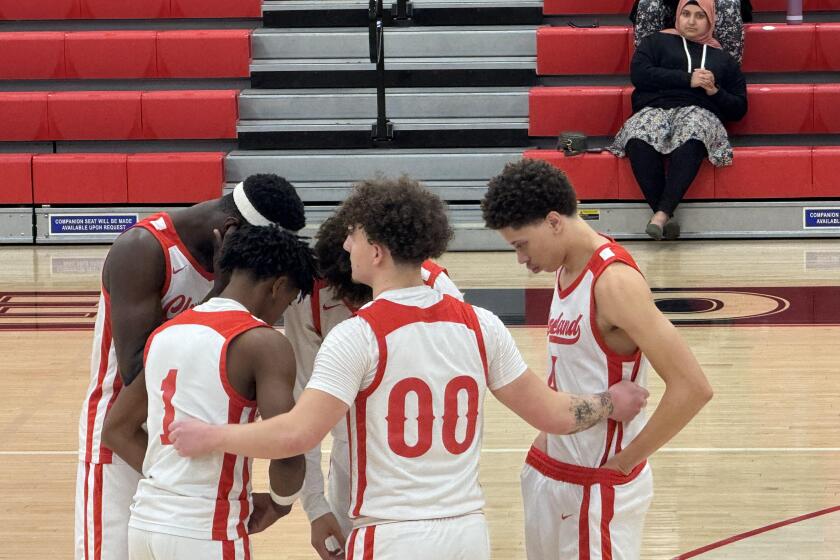The Ultimate Public Franchise
- Share via
The grind of the corporate bottom line has not been kind to Southern California. Our banks have been gobbled up by out-of-town buyers and everyone at McDonnell Douglas will soon be working for a bunch of engineers from Seattle. The Rams and Raiders are gone. Now the corporate-takeover barons are licking their chops at the prospects of buying the crown jewel of baseball, the Dodgers.
Is there any way to stop the course of “progress” from ‘40s-style benevolent family ownership to the cold calculation of ‘90s-style economic globalism? Can we in Los Angeles expect anything but the same from the CEO’s who routinely use team ownership to bludgeon communities into financial concessions that bust municipal budgets or rip teams from their roots in the search of the best deal.
Some Angelenos who want to keep the Dodgers in Los Angeles are looking to a Midwestern city for salvation. In Wisconsin, the Nation Football League’s Green Bay Packers are a community-owned, nonprofit, public-benefit corporation. Each year the owners of the team’s shares meet, elect a board of directors and discuss the team’s prospects for the coming year. The board of directors hires professional management to run the team.
The Packers have operated this way since their inception--including a provision that, should the team go out of business, a local American Legion Post would receive what ever cash is left over. Shareholders receive no dividends, interest or benefits other than their annual vote for the board--and the joy of insuring the Packers stay in Green Bay.
In an era of the rapacious Jerry Jones of Dallas and cap-stretching Eddie DeBartolo of San Francisco, the quaint, publicly held Packers are in the Super Bowl next week. Both Dallas and San Francisco fans will be watching from home.
With names like Rupert Murdoch, Peter Ueberroth and Jerry Buss reported to be in the chase, how can the mothers and fathers of future Dodger fans and players compete? Millions of Dodger fans know little about synergistic video rights or international marketing strategies, but by buying tickets, they provide a good deal of the income that drives the Dodgers and other franchises. How many Dodger fans would pay $35 for a share of the Dodgers--if their purchase guaranteed the Dodgers would stay in Los Angeles for their children to enjoy? How many small-business owners would buy 10 shares to insure that a Dodger game will remain a way to close a sale, reward an employee or kick back after a long day?
For less than the cost of taking a family of four to a game, fans could make an investment in their community and save one of its most important assets. Even with a limitation on the number of shares an individual can own, the numbers add up quickly. If three million fans attend Dodger games each year, will two to three million shares be that hard to sell?
Keep in mind that the stock sales would provide the cash portion of a bid to purchase the Dodgers. The fans’ $70-100 million is a great leg up on the corporate competition, when combined with mortgages on the real estate, contracts for advertising and naming rights and other revenue sources. Add the goodwill of local governments and the surrounding community and tax benefits of operating as a nonprofit--and mom and pop may just be able to save the Dodgers.
The mega-corporate alternative paints a far darker picture for Los Angeles. With the Wall Street Journal already saying that buying a team causes a company’s stock to fall, public stockholders will be wary of any corporation’s purchase of a team. An early major hurdle for the new owner will be the reconstruction or major renovation of Dodger stadium. The daunting task of reshaping Chavez Ravine has been reported as one major reason why the O’Malleys are moving on. Faced with the hostile, pay-your-own way mentality of Los Angeles, how will a corporate owner turn down a new, $200-million ballpark paid for by the people of Phoenix or Tokyo?
A new private owner might well decide to move the Dodgers to a new city. Hello, Brooklyn. Why risk a spread of L.A.’s NFL football drought to yet another sport? A shared sense of community, friendly competition with other cities, jobs and a sense of order in an increasingly chaotic world could all be lost at the hands of a bottom-line-driven corporate owner. Remember the L.A. . . . St Louis Rams; and the L.A. . . . Oakland Raiders.
Somewhere between the benevolent paternalism of the O’Malleys and the corporate model typified by Ted Turner, George Steinbrenner III and Leon Hess is a form of ownership that will provide Los Angeles with the solution to its dilemma. Before Los Angeles runs headlong into the arms of a corporate white knight, it may want to look to itself for salvation.*
More to Read
Go beyond the scoreboard
Get the latest on L.A.'s teams in the daily Sports Report newsletter.
You may occasionally receive promotional content from the Los Angeles Times.










